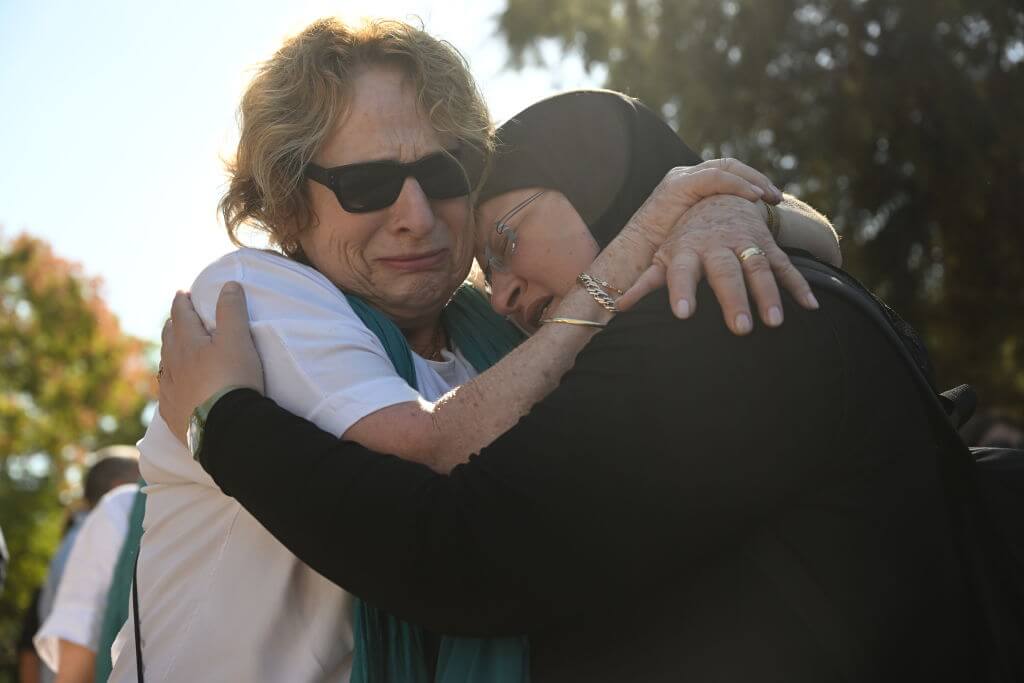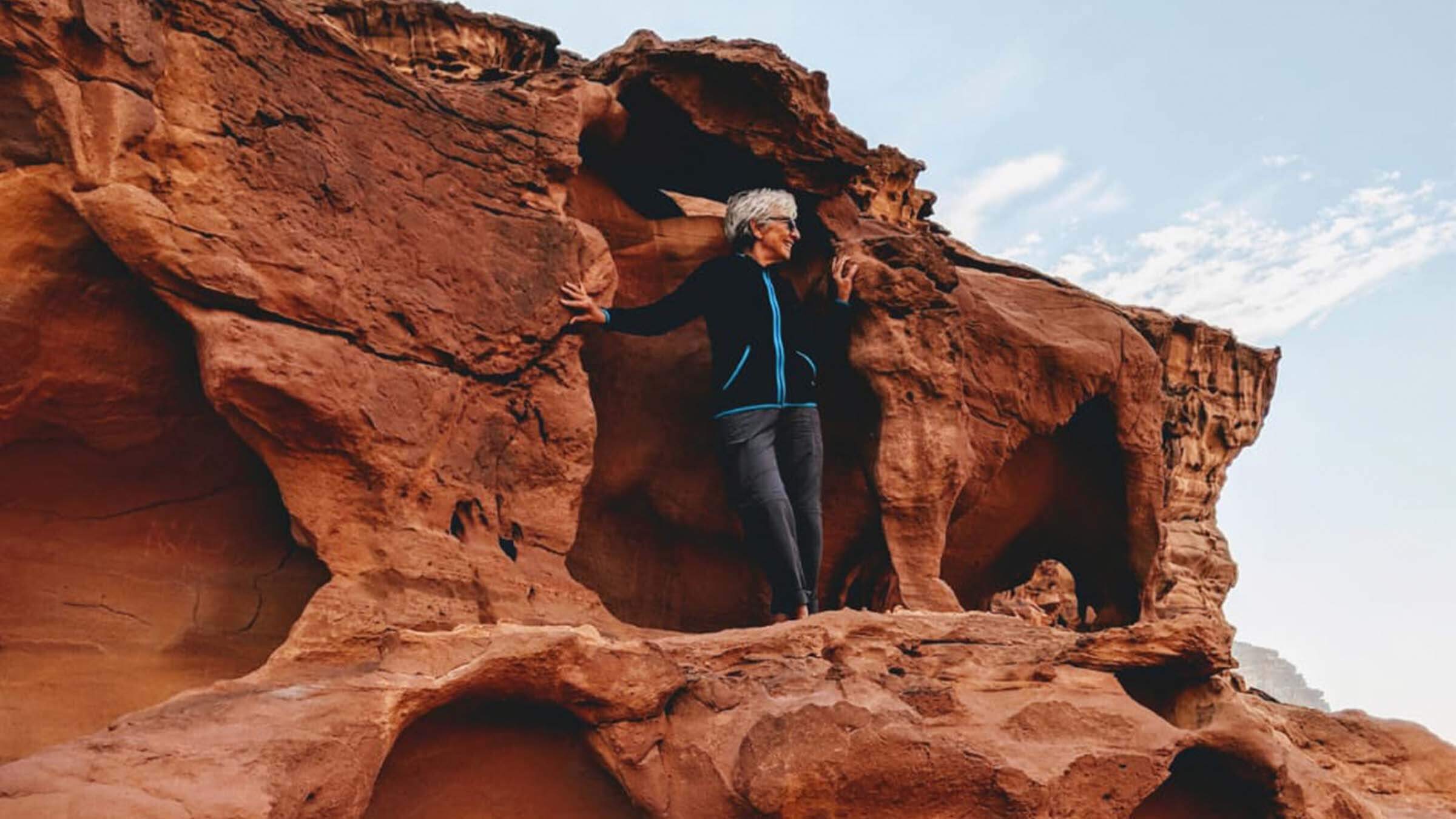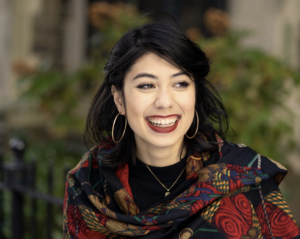Jews and Arabs may yet ‘get through this together.’

Mourners grieve for peace activist Vivian Silver, 74, who was killed during the October 7th Hamas attack on kibbutz Be’eri, during a memorial service on November 16, 2023 in Tel Gezer, Israel. Photo by Getty Images
FORWARD
Senior Columnist
“How can I support Israel when I don’t trust its government?” someone asked me recently.
It’s a question I struggle with as well. Hamas carried out the terror attacks of Oct. 7. But Prime Minister Benjamin Netanyahu made Israel vulnerable by helping Hamas remain in power as a way to divide and weaken Palestinians. He allowed suitcases of cash to flow into Hamas coffers, telling a Likud party meeting in 2019, “Anyone who wants to thwart the establishment of a Palestinian state has to support bolstering Hamas and transferring money to Hamas.”
Three weeks in, 80% of Israelis believe Netanyahu failed to prevent the attack, and only 4% of Israelis trust Netanyahu to tell the truth about the war.
If you don’t trust the government, I told the woman asking me, support the Israel you do trust. Support the Israel that offers hope.
The saddest photograph
On Nov. 16, 1,500 gathered in Israel to mourn peace activist Vivian Silver, 74, who had been presumed kidnapped but was in fact murdered in her home during the Oct. 7th Hamas attack on Kibbutz Be’eri.
“Vivian had taught us all, by example, that the only hope for this country, the only future for this country, is Arab-Jewish cooperation on the basis of equality,” wrote Silver’s friend Bradley Burston, who attended her memorial service.
There’s a photo from the memorial showing an Arab and Jewish woman collapsed in grief in each other’s arms. It’s one of the saddest photographs I’ve ever seen.
Yet it gives me hope — that the dream of coexistence didn’t die with Silver. That there are numerous civil society groups and political movements and individuals in Israel and among Palestinians that are carrying her mantle.
One of them, Standing Together, is having a moment. Founded in 2015, the grassroots movement organizes protests, get-out-the-vote campaigns and educational efforts for economic equality, climate justice and an end to the occupation.
Two of its founders, Sally Abed, an Israeli Arab, and Alon-Lee Green, an Israeli Jew, just completed a U.S. speaking tour sponsored by the New Israel Fund, which has been featured in the New York Times, NPR and CNN.
“We condemn Hamas and the barbaric slaughter of women and children,” Green said on CNN. “But we also know that revenge is not a war plan. Anger can’t lead us out of this situation. There are millions of people living on this land—some of them Palestinian, some of them Jewish, no one is going anywhere. We need to be able to live on this land together.”
Green and Abed spoke to a packed audience at B’nai Jeshurun in Manhattan Nov. 8, and an hour-long Zoom discussion with them last week drew over 1000 participants.
“We need a new political story,” Abed, who lives in Haifa, said during the Zoom discussion. “We need a new political protagonist, a new majority of Palestinians and Jews who share the interests of peace, of equality and social justice.”
The problem, she said, are leaders on both sides who don’t prioritize peace.
“What has been extremely difficult for us, especially as Palestinians, is the Palestinian liberation movement that has been unable to condemn the Hamas attack,” she said, “and that hasn’t been able to recognize this moment as a moment where we define what is a justified way for us to actually call for Palestinian liberation.”
Green echoed her perspective from the Jewish Israeli point of view.
“When I fight against occupation,” he said, “I’m not doing it just to stand in solidarity with Palestinians. I’m doing it because it is in the interest of the Israeli people to achieve security and end this endless war.”
The genius of Standing Together is that they fight for issues of economic justice that cross Israel’s Arab and Jewish divide — like raising the minimum wage, climate change and women’s rights — while carrying on the struggle for Arab equality, which has only gotten more difficult since the Hamas attacks.
Abed said the war opened up a “new front” against Palestinians in Israel and the West Bank, as well as against those who defend them. On Oct. 18, Jerusalem police detained an Arab and a Jewish member of Standing Together and confiscated the posters they were distributing. The offending posters read, “Jews and Arabs, we will get through this together.”
Before you dismiss Standing Together’s vision as idealistic claptrap peddled to gullible American lefties, consider Israel during the coronavirus pandemic. Arabs, which make up 20% of Israel’s population, had become more integrated than ever into the country’s social fabric, especially in its now-critical health sector.
According to government data obtained by Haaretz, 47% of Israel’s pharmacists are Arab, as are 24% of its nurses and 17% of its doctors. A 2020 Israel Democracy Institute study found 43%of Arabs said they felt they were a part of the state and shared with it a common destiny. Though he noted there were still many obstacles to equality and acceptance, among all sides, writer Yossi Klein Halevi wrote at the time that the pandemic created “a crisis that is finally bringing us together.”
You would think Israel’s military campaign against Hamas, which has killed over 11,240 Palestinians, would crush any feelings of cooperation, but so far that hasn’t happened.
When the Israel Democracy Institute repeated its survey this month, it found 77% of Arab Israelis felt a part of Israel and its problems — the highest number in the survey’s 20-year history. The largest increase in feeling part of the State of Israel and its problems was among the youngest cohort, aged 18–24.
People like Abed and Green are also the most hopeful counterargument to the simplistic anti-Israelism on college campuses. If Jews and Arabs are standing together there, why would you stand against their shared country here? Nothing complicates a good slogan like reality.
In the welter of war news, we don’t hear statistics like these, or the stories behind them. You read about Hamas rockets nearing Ben Gurion Airport, but you probably didn’t read about the Lod-based Jewish-Arab NGO, Citizens Build a Community, that harvested vegetables from nearby farms affected by wartime labor shortages. Even as the death tolls mount, a robust coexistence sector is working towards the day after.
I met Silver once when she was on a fundraising tour of the States, championing one of the Arab-Israeli coexistence groups to which she devoted her life. She was compact, forceful and visionary. One organization she co-founded, AJEEC-NISPED, pioneered community development projects between Arabs and Jews in southern Israel. Another, Women Wage Peace, became one of the largest grassroots peace movements in Israel. No wonder Bedouin women, Israeli Arabs and Jews cried together over Silver.
Before Hamas murdered her, Vivian Silver spent her last years volunteering for a group called Road to Recovery, driving sick Gazans to cancer treatments in Jerusalem. There are many Jews and Arabs in Israel involved in similar efforts of coexistence, with zero illusions about how difficult building a shared society and rebuilding trust will be when this war is over.
Silver’s life — and the work of Standing Together — remind us that the war between Israel and the Palestinians is not between Arabs and Jews, but between extremists and moderates, between ideologues and pragmatists. The bitter wounds of this war — the unconscionable child death toll in Gaza, Hamas’s atrocities in Israel — will take time to overcome. But those who believe in coexistence aren’t dreamers. The people who think occupation and force can keep Israel secure, or that violent resistance will bring justice to Palestinians — they’re the ones who are dreaming.
RELATED OPINION How to talk to people who hate Israel

Rob Eshman is a senior columnist for the Forward. Follow him on Instagram @foodaism and Twitter @foodaism or email eshman@forward.com.
The views and opinions expressed in this article are the author’s own and do not necessarily reflect those of the Forward. Discover more perspectives in Opinion.
‘Vivian, we’re listening’: A poem in loving memory of Israeli peace activist Vivian Silver

The Israeli peace activist Vivian Silver in 2018 at Wadi Rum, Jordan
Courtesy of Shifra Bronznick
Editor’s Note: This poem was written in loving memory of the Israeli-Canadian peace activist Vivian Silver, who was confirmed dead on Nov. 13, after authorities identified her remains at her home through DNA testing. Silver, 74, was previously assumed to be among the more than 200 people held hostage in Gaza following the Oct. 7 attack. She is now believed to have been killed by Hamas during the Oct. 7 massacre.
I think of you,
leaning over your porch for years
as the sky over Gaza turned orange
and blue and then orange again.
I wonder when peace died
and fear it was long before
you were born. Lifetimes before
the sand and the sun
and the promise of a communal
way of life brought you
to the place where you died
Maybe I’m lacking imagination.
I can’t see what you could.
There’s so much I’m unable to imagine.
I called your death unimaginable, too,
but then
the sun had gone down early,
New York was so cold and I’m sorry,
I pictured it.
Your scarves,
your posters, every thank you gift
from your friends, engulfed
as the southern air turned
wholly to flame.
You, crouching in your
safe room, every piece of your story
eating you from the inside.
And now it’s eating me, and
I just needed to tell you.
I never knew you but I have this feeling
I could have been you, long ago,
the North American sixties behind me,
the corporate, saccharine eighties
before me, looking for hope and finding it
in the place where you died.
Maybe, wherever you are now,
watching the sky turn black
from far far away, you can help us.
Maybe in that unimaginable moment
when you realized you were leaving this place,
something else dawned on you, something important.
Would you whisper it in the wheat fields?
In the shallow breath of a still-living child?
In the flutter of a small paper sign
in the middle of a thunderous rally?
Vivian, we’re listening.
To contact the author, email editorial@forward.com

No comments:
Post a Comment